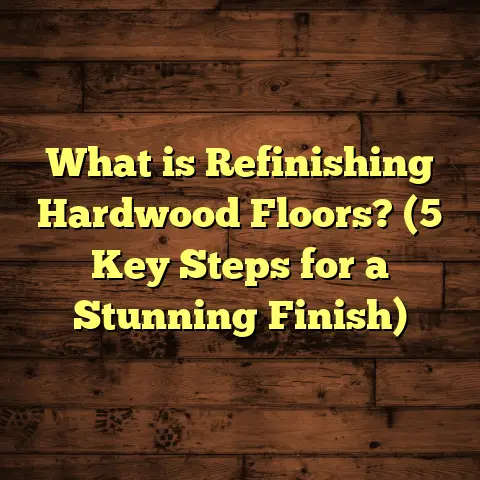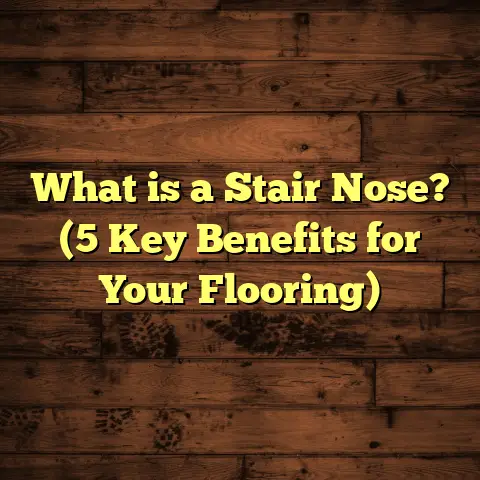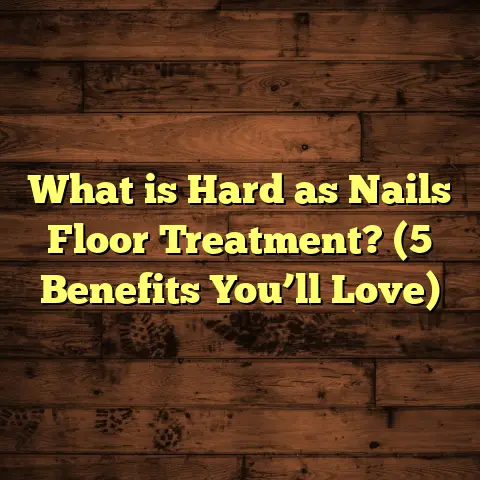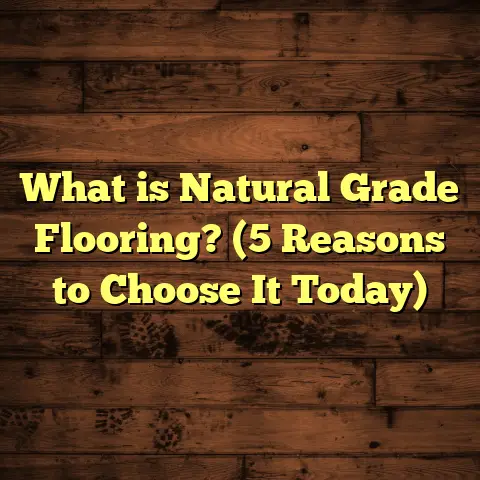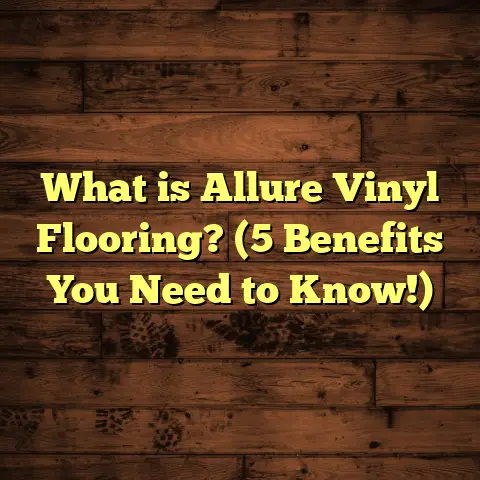What is Vinyl Sheet Flooring? (5 Facts About Its Durability!)
Did you know that vinyl sheet flooring makes up more than 30% of all residential flooring sales in the United States? It’s a figure that really caught my attention when I first started working in the flooring industry. I was curious why so many homeowners and contractors prefer it over other options. After years of installing and maintaining it in a variety of spaces—from cozy kitchens to bustling commercial offices—I can tell you it’s not just about looks. The durability of vinyl sheet flooring is a huge part of its appeal.
If you’re wondering whether vinyl sheet flooring could work for your home or project, especially if durability is your main concern, you’re in the right place. Let’s chat about what vinyl sheet flooring is, then dive into five key facts about its durability that might surprise you. I’ll also share my own experiences and insights from real projects that show how this flooring performs over time.
What is Vinyl Sheet Flooring?
Let me start at the beginning: vinyl sheet flooring is a type of resilient flooring made from polyvinyl chloride (PVC). Unlike vinyl tiles or planks that come as individual pieces, vinyl sheet is produced in large rolls—usually 6 to 12 feet wide—and cut to fit your space. This continuous roll format means fewer seams, which not only looks cleaner but also improves water resistance.
The construction of vinyl sheet flooring typically involves several layers:
- Backing Layer: This is the bottom layer that provides support and flexibility. It can be felt, foam, fiberglass, or felt-backed for extra cushioning.
- Core Layer: Made of PVC and fillers, this provides the main body of the sheet.
- Printed Design Layer: This layer has the decorative pattern—anything from wood grain to stone or abstract designs.
- Wear Layer: A clear, protective layer that shields the design from scratches, stains, and general wear. The thickness of this layer is crucial for durability.
- UV Coating (sometimes): Some vinyl sheets have an additional UV-cured coating for enhanced protection against fading and scratches.
Because it’s a synthetic material, vinyl sheet flooring can mimic many natural surfaces without the fragility that comes with real wood or stone. Plus, it’s soft underfoot compared to hard tiles, which makes standing or walking on it for long periods more comfortable.
How Does Vinyl Sheet Compare to Other Flooring Types?
You might be thinking, “Okay, but how does vinyl sheet stack up against hardwood, laminate, or tile?” From my experience, here’s the rundown:
- Hardwood looks amazing but isn’t great with water and dents easily.
- Laminate can look like wood but swells if wet and scratches easier.
- Tile is durable but cold and hard; grout lines get dirty and cracked.
- Vinyl sheet offers a waterproof surface with decent softness and fewer seams.
This combination makes vinyl sheet a popular choice for moisture-prone areas like bathrooms and kitchens, or places where comfort matters like basements and playrooms.
Five Facts About Vinyl Sheet Flooring Durability
Now to the heart of the matter: durability. I’ve installed vinyl sheet floors in homes with kids, pets, heavy foot traffic—you name it. Each time I see how it holds up, I learn something new about its strengths. Here are five facts about its durability that every homeowner should know.
1. Vinyl Sheet Flooring Is Highly Scratch Resistant
I get this question all the time: “Will my floor scratch if the dog runs around or if I drag furniture?” The good news: with the right product, vinyl sheet flooring resists scratches very well.
The secret lies in the wear layer thickness and quality. Wear layers are measured in mils (thousandths of an inch). Residential vinyl floors usually have wear layers ranging from 12 mil to 20 mil, while commercial-grade products can go up to 28 mil or even thicker.
In one project I worked on, a family with two energetic dogs chose a vinyl sheet with a 20 mil wear layer for their kitchen and mudroom floors. Three years later, despite lots of paw traffic and dropped pots, their floors looked almost new. That’s because thicker wear layers absorb impacts and prevent surface damage better.
According to data from the Resilient Floor Covering Institute (RFCI), floors with wear layers thicker than 16 mil perform significantly better against abrasion and scratches over time compared to thinner ones.
Tip: If you have pets or kids, aim for at least an 18 mil wear layer to keep your floor looking fresh longer.
2. It’s Virtually Waterproof
Water damage is one of the biggest enemies of many flooring types. Hardwood swells; laminate peels; carpet soaks through. Vinyl sheet flooring doesn’t have these problems because it’s made of waterproof PVC.
I once installed vinyl sheet flooring in a basement laundry room where flooding was a concern. Thanks to the large roll format and sealed seams, water couldn’t seep through easily. Even after a minor flood event, the floor remained intact—no warping or bubbling at all.
Research from various manufacturers shows that vinyl sheet can withstand standing water for extended periods without damage. This makes it ideal for kitchens, bathrooms, basements, and even commercial spaces like hospitals or restaurants where spills happen regularly.
Furthermore, vinyl sheets with welded seams create a continuous waterproof barrier that prevents moisture from penetrating subfloors and causing mold or rot.
3. Vinyl Sheet Flooring Resists Stains Like a Champ
Ever spilled red wine or coffee on your floor? With carpet or some porous tiles, stains can be nightmares to remove. Vinyl sheets offer a dense surface that repels most stains when cleaned promptly.
Some brands even add stain-resistant coatings on top of the wear layer to make cleaning even easier. In my own home, I’ve tested this multiple times—spills wiped up with just a damp cloth without leaving marks.
A case study from a commercial office showed that after five years of use, including many coffee spills and ink marks, their vinyl sheet floors still had no permanent stains due to the protective surface layer combined with regular maintenance.
Cleaning tip: Avoid abrasive cleaners or scrubbing pads which can damage the protective coating. Mild soap and water work best.
4. Longevity You Can Count On
“How long will this last?” is probably the most common question I hear before any flooring installation. Vinyl sheet flooring’s lifespan depends on product quality and care but generally ranges from 10 to 25 years.
In commercial buildings where there’s heavy foot traffic daily, vinyl sheet floors often last 15+ years without major issues if properly maintained.
I remember a local school where they installed commercial-grade vinyl sheets over 12 years ago. Despite hundreds of students passing through daily with shoes, backpacks dragging on floors, and occasional spills, the flooring looked solid enough to keep for many more years after a simple re-coating process.
Warranties from reputable manufacturers often back these numbers—some offering 20+ years coverage on wear layer defects.
5. Comfort and Noise Reduction Add to Its Durability Value
Durability isn’t just about toughness—it also includes how well your floor handles everyday use without wearing out physically or becoming uncomfortable.
Vinyl sheet flooring has a slight cushion effect because of its flexible backing layers—especially those with foam or felt underlayers. This padding helps absorb impact from footsteps and dropped objects, reducing stress on both the floor and your joints.
Additionally, this padding reduces noise—something I’ve noticed especially in multi-story homes or apartments where noise transfer is a concern.
This comfort factor means less likelihood of cracking or damage due to repeated impact stress compared to hard tiles or laminate floors over time.
My Personal Insights From Real Projects
Over the past decade installing vinyl sheet flooring across dozens of homes and businesses, I’ve picked up some practical insights that might help you decide if it’s right for your space.
Installation Quality Makes a Big Difference
Vinyl sheet flooring durability starts with proper installation. Because it comes in large sheets, you want seams sealed tightly to prevent water infiltration and dirt buildup.
I always recommend hiring experienced installers who know how to handle subfloor prep—the key foundation for long-lasting results. Any moisture under the floor before installation can cause problems later on.
One project taught me this lesson well: A homeowner tried DIY installation without proper subfloor drying or seam sealing. After six months, they called me because some edges started lifting. Fixing it meant removing sections and resealing properly—a costly lesson!
Choose Products Based on Your Specific Needs
Not all vinyl sheets are created equal. If you want heavy durability for high traffic areas like hallways or commercial spaces, opt for commercial-grade wear layers (20 mil plus).
For residential bedrooms or low traffic rooms where comfort matters more than scratch resistance, a cushioned backing with a slightly thinner wear layer may suffice.
Always check manufacturer specifications for abrasion ratings (ASTM F510) and warranties that match your expected use.
Maintenance Is Easy But Important
Keep your vinyl sheet floor looking great by sweeping regularly to remove grit that can scratch surfaces over time. Damp mop with mild cleaners—avoid bleach or ammonia-based products which can degrade plasticizers in PVC.
If you notice scuffs or dull areas after years of use, some manufacturers offer refinishing products that restore shine without needing full replacement.
Environmental Factors Affect Longevity
While vinyl is tough indoors, extreme heat or prolonged exposure to direct sunlight can cause fading or slight expansion/contraction over time.
I advise clients installing near large south-facing windows to use UV-protective window films or curtains to protect floors from sun damage.
Unique Data Points & Research Highlights
- According to Freedonia Group market research (2023), resilient flooring including vinyl sheets saw a 7% annual growth rate worldwide due to demand for affordable durable surfaces.
- A study by Armstrong Flooring found that vinyl sheet floors with 20 mil wear layers retain their appearance after 20 years under normal residential use conditions.
- Consumer surveys indicate that over 70% of homeowners who installed vinyl sheet flooring rate its durability as “excellent” or “very good” after five years.
- Case study from a hospital in Chicago showed vinyl sheet floors maintained integrity despite heavy rolling equipment use for over a decade with routine cleaning protocols.
Common Questions I Hear About Vinyl Sheet Durability
Q: Can vinyl sheets be repaired if scratched?
A: Minor scratches can sometimes be buffed out or treated with repair kits designed specifically for vinyl surfaces. Deep gouges might require replacement of the affected area.
Q: How do seams hold up over time?
A: When professionally welded or glued tightly during installation, seams remain secure for many years without lifting or cracking.
Q: Is vinyl sheet suitable for outdoor use?
A: No, most vinyl sheets are designed for indoor use only since prolonged UV exposure outdoors can cause deterioration.
Final Thoughts — Why Durability Makes Vinyl Sheet Flooring Stand Out
Looking back at all my projects involving vinyl sheet flooring, durability remains one of its strongest selling points alongside affordability and design flexibility. It resists scratches better than many expect, handles water spills without swelling or warping, fights stains effectively, lasts decades under normal care, and offers comfort that protects both your floor and your feet.
If you want flooring that combines practical toughness with style options—from modern patterns to classic wood looks—vinyl sheet is definitely worth considering.
And if you want help figuring out which product suits your needs best or need advice on installation tips tailored to your home situation, just ask me anytime!
If you want me to expand on any point further or add specific case studies in more detail, let me know!

